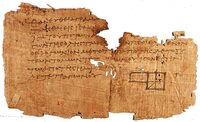Measurement (nonfiction): Difference between revisions
No edit summary |
|||
| Line 1: | Line 1: | ||
[[File:Oxyrhynchus papyrus I-29 Euclid's-Elements.jpg|200px|thumb|Fragment of the | [[File:Oxyrhynchus papyrus I-29 Euclid's-Elements.jpg|200px|thumb|Fragment of the Oxyrhynchus Papyri.]]'''Measurement''' is the assignment of a number to a characteristic of an object or event, which can be compared with other objects or events. | ||
The scope and application of a measurement is dependent on the context and discipline. | The scope and application of a measurement is dependent on the context and discipline. | ||
Revision as of 04:02, 14 June 2016
Measurement is the assignment of a number to a characteristic of an object or event, which can be compared with other objects or events.
The scope and application of a measurement is dependent on the context and discipline.
In the natural sciences and engineering, measurements do not apply to nominal properties of objects or events, which is consistent with the guidelines of the International vocabulary of metrology published by the International Bureau of Weights and Measures.
However, in other fields such as statistics as well as the social and behavioral sciences, measurements can have multiple levels, which would include nominal, ordinal, interval, and ratio scales.
Measurement is a cornerstone of trade, science, technology, and quantitative research in many disciplines.
Historically, many measurement systems existed for the varied fields of human existence to facilitate comparisons in these fields. Often these were achieved by local agreements between trading partners or collaborators.
The science of measurement is pursued in the field of metrology.
Fiction cross-reference
Nonfiction cross-reference
External links
- Measurement @ Wikipedia
